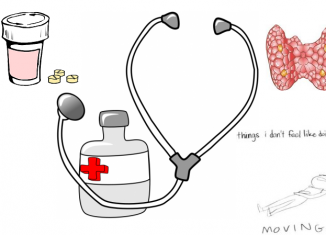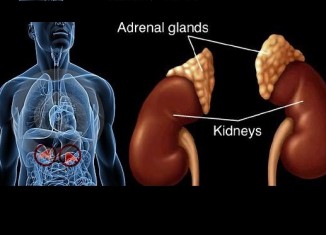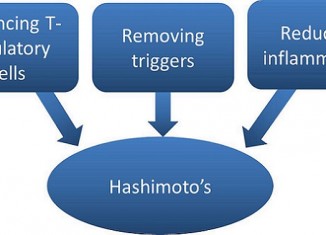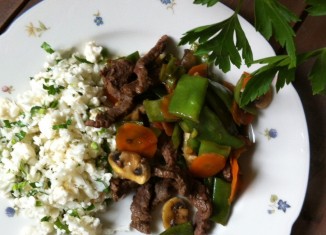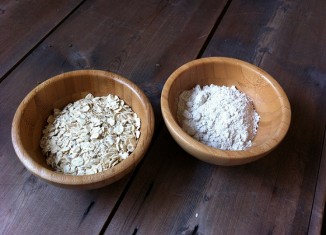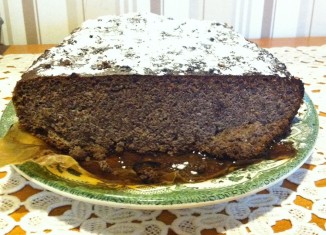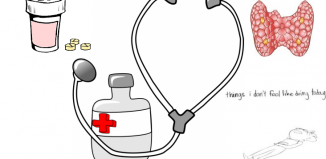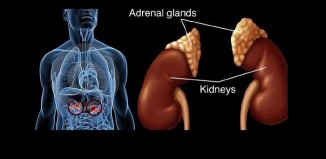What I have learnt about Hashimoto’s is that it is not the same as hypothyroidism. It is an autoimmune condition and it shouldn’t be treated just as any other form of thyroidism. Although it is shown in scientific literature, it is not introduce in practice by the conventional medicine.
The treatment of Hashimoto’s should actually be focused on treating the immune system. Such an overactive immune system that attacks the body’s cells needs to be calmed down. This is important. Some try to improve their health by using ‘superfoods’ but it seems that not everybody understands that ‘superfoods’ are highly functional ingredients. They can stimulate human organism and be beneficial to health but they can also be harmful when used incorrectly, especially for those who already developed some disease(s). Before using ‘superfoods’ it is good to research if the particular ingredient benefits our individual condition.
Literature shows that if the treatment of Hashimoto’s doesn’t direct the immune system but instead only suppresses the symptoms of Hashimoto’s, the immune system will attack other body tissues. The immune system is programmed to protect us. When it sees a threat it attacks. What triggers the imbalanced reaction of the immune system (and an auto attack) is still not fully understood. Recent studies suggest that the ‘leaky gut’ can be one of the reasons. It seems that once such an auto-attack is activated it cannot be stopped. It can however be reduced.
How to soothe the autoimmune reaction
Our immune system has two main arms: Th1 and Th2.
Th1 is responsible for the production of NK cells (natural killer) and T cells (lymphocytes = white blood cells), which are responsible for ‘killing the intruders’, whereas Th2 is responsible for the production of B lymphocytes, which point out the cell that must be destroyed.
Usually, one of the arms is more active than another and a suitable treatment should be adjusted accordingly. To define this, usually the level of cytokines is tested. Cytokines are small proteins used in cells communication, also in communication between the lymphocytes Th (helpers) and the immune system.
Cytokines are a bit like hormones. Too high level of cytokines Th1 or Th2 blocks thyroid receptors and does not allow hormones to enter the cells. This blockage leads to hypothyroidism.
How do we know which cytokines dominate (Th1 or Th2)
Cytokines of Th1:
- IL-2
- IL-12
- TNF alpha
- Interferon
Cytokines of Th2:
- IL-4
- IL-10
- IL-13
Balancing Th1 and Th2
Balance between Th1 and Th2 is essential to improve functioning of thyroid in Hashimoto’s patients. It requires adaptation of a new diet and lifestyle, aimed at calming the immune system.
It is necessary to support and balance the lymphocytes T (regulatory). What helps:
- Vitamine D (the highest safe level)
- EPA/DHA (Omega3)
- Glutathione (ref)
Besides, the weaker arm of the immune system should be stimulated.
Stymulation of Th1 (when Th2 dominates)
- Astragalus
- Echinacea
- Mushrooms’s Beta-glucan
- Mashroom Maitake
- Liquorice
- Melissa
Stymulation of Th2 (when Th1 dominates)
- Caffeine
- Green tea
- Grape seed extract
- Pine bark extract
- Willow bark extract
- Lycopene
- Resveratrol
- Pycnogenol
Modulation of Th1 and Th2
- Probiotics
- Vitamine A
- Vitamine E
- Colostrum
Lowering IL-1*, activation of Th1 and Th2
- Boswellia
- Pancreas enzymes
- Turmeric (Kurkuma)
*IL-1 = cytokines, which play a central role in the regulation of immune and inflammatory responses.
It sounds straightforward. But it seems that it is not that easy to test which arm of the immune system is weaker. Perhaps this is also a reason why it is not commonly practiced (it sounds pricey too). This is why, paying an attention to the body responses is very important. For example, how a person reacts to the stimulants associated with the particular arm, Th1 or Th2.
Also, it seems that in some cases, both arms Th1 and Th2 are equally dominant but the level of the lymphocytes T is low. That means that some antigen is stimulating the immune system. An antigen can be a fungus, virus, heavy metal, pesticides or gluten.
Figures 1-5
Source: Tluste Zycie (Highly recommended if you can read Polish)

